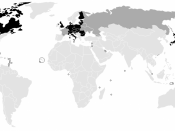A) Assessment of Climate Change Conference Statement and Commitments: International NGO (Non-Government Organization) i) The ambition in the statement and commitments is in the desired direction of recognizing that human action is influencing the global climate, and that efforts must be undertaken by all Parties to control greenhouse gas emissions. However, the statement and commitments are just a small start in what must be an ongoing and ever increasing commitment to globally reduce greenhouse gas emissions.
ii) #1) More Strict Reductions of Net Emissions There is a significant delay in taking action with regards to reducing greenhouse gas emissions. The goal to "reduce net emissions by 27% of 1990 levels"� is not as high a goal as is needed. This figure is far below compared to the International Panel on Climate Change (IPCC) alert that we need to reduce 50-70 % for CO2 concentration stabilization at the current levels (IPCC Working Group I).
The atmospheric concentrations of greenhouse gases are rising; carbon dioxide (CO2), methane (CH4) and nitrous oxide (N2O) have grown significantly by about 30%, 145%, and 15%, respectively (values for 1992) (IPCC Working Group I). These gases are increasing quickly and their negative effects are well documented (see Figure 1.1). The net reduction should be higher if we are to accomplish our goal of moderating climate change.
#2) Climate Change Is Dangerous The second statement ""æthere is still uncertainty over whether this climate change is dangerous, and whether negative effects are felt by all countries"� is a false statement. This statement may be used by polluting countries as a reason to delay fulfilling their commitments. It should be amended to read: "Climate change has implications for ecosystems, food production and sustainable economic development. Therefore climate change is dangerous, and all countries are vulnerable to its negative effects."� Should...


